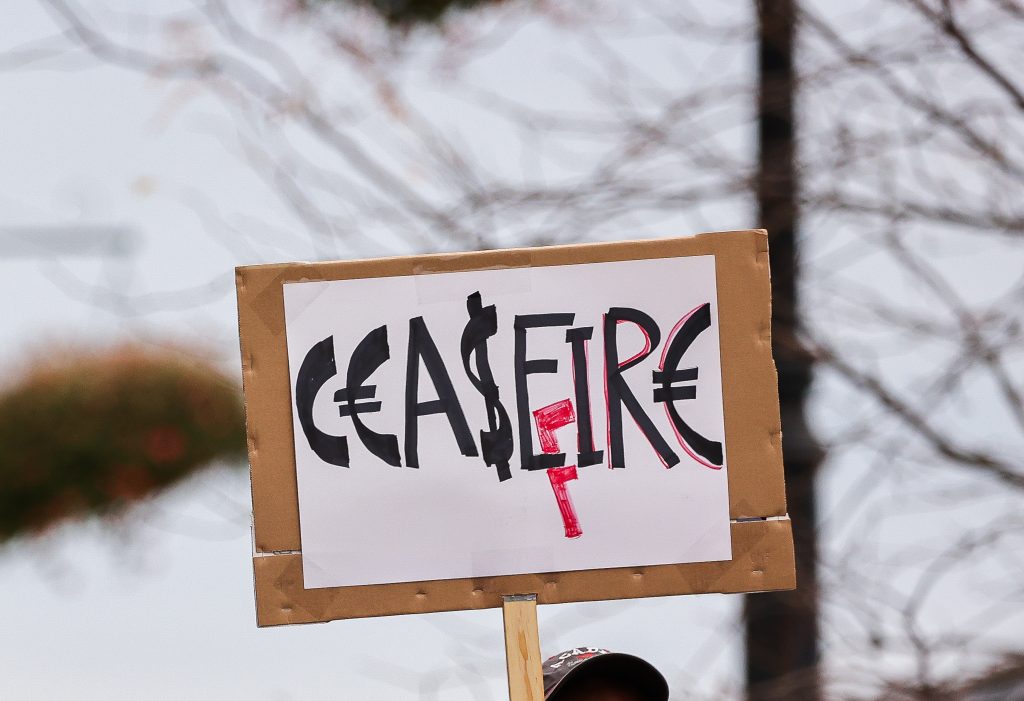A resolution calling for a cease-fire in Gaza, the release of hostages and increased humanitarian aid to Gazan civilians was presented for the Binghamton City Council’s consideration last month.
It was introduced by Amari Pavati, a sophomore double-majoring in geography and classical studies who serves as president of the New Yiddish Bund of Binghamton — a student group building community for Jewish students whose views may diverge from more established campus organizations. Supporters include Veterans for Peace and Peace Action — local grassroots organizers that have long called for a cease-fire.
The resolution will be sent to elected leaders in higher offices — President Joe Biden, U.S. Sens. Chuck Schumer and Kirsten Gillibrand, U.S. Rep. Marc Molinaro, Gov. Kathy Hochul, State Sen. Lea Webb ‘04 and Assemblywoman Donna Lupardo MA ’83 — if it passes.
“A cease-fire resolution from the Binghamton City Council [sent] to our federal representatives amplifies Binghamton voices that have been concerned for months,” the resolution’s executive summary reads. “Binghamton’s contribution to the military via local contractors and manufacturers, as well as the importance to residents, give the City Council the right and responsibility to pass the resolution calling for a cease-fire.”
The general public can request legislation for the council’s consideration under Binghamton’s City Charter. The mechanism was used in February when a resident proposed dissolving the Binghamton City Police.
If the council approves the legislation, Binghamton will join other municipalities across New York state, including Ithaca and Albany, in calling for a permanent cease-fire. Across the United States, the peace movement has won support from many major cities, including Chicago, Detroit, Atlanta, San Francisco, Seattle and Minneapolis.
Pavati presented their resolution to the council on March 25. At the meeting, Councilmen Robert Cavanaugh II and Michael Dundon said they wanted to avoid overshadowing local work and expressed hesitation at weighing in on international geopolitical crises as local legislators. In contrast, Councilmen Olamni Porter and Nate Hotchkiss appeared supportive of advancing the legislation.
Kinya Middleton, the chamber’s majority leader, said she heard and understood both positions and that the council could address local issues and take a moral stand.
As the humanitarian crisis continues, the State Department has concluded famine has likely struck civilian populations and the Aid Worker Security Database has said Gaza is the most dangerous place for aid workers since Oct. 7. On Tuesday, an Israeli airstrike killed seven aid workers from World Central Kitchen, a United States-based nonprofit, prompting an apology from the Israeli government after international condemnation.
“Numerous humanitarian aid organizations have insisted that a cease-fire is the only way to [ensure] lives in Gaza are saved from the imminent famine,” Pavati wrote in an addendum to their proposed legislation. “Similarly, a cease-fire without ensuring the [United States] reinstates its funding for the United Nations Relief and Works Agency and continual funding to other organizations will not avert disaster either. Both are needed to save Palestinian lives in Gaza.”
In a recent Security Council vote, 14 member states supported a binding resolution demanding an immediate cease-fire during the holy month of Ramadan, which would then lead to a lasting and sustainable cease-fire. The United States abstained from the vote, allowing its passage in a break from longstanding diplomatic tradition.
As the movement for a permanent cease-fire has grown internationally, local activists have advocated in parallel. Late last month, community and student leaders came together to rally for Palestine at the University Downtown Center, urging divestment from Israel’s military and an academic and cultural boycott of Israeli institutions.
“City Council has to recognize that we are contributing to the famine and genocide, and they represent people who want that to change,” Pavati wrote. “I believe it’s absolutely in the scope of their powers to act as an amplifier for their constituents. City councils — including in Binghamton — have passed similar resolutions numerous times when the circumstances are this horrific.”
The resolution is set to receive a vote at an April 10 business meeting. Pavati said councilmembers have been receptive, and they recognize the moment’s gravity. Along with a campaign protesting the Democratic primary in New York by submitting a blank ballot, he hopes to force federal officials to listen.
“A resolution from a city council sends an extremely powerful message to our representatives that can’t be ignored,” he wrote.



